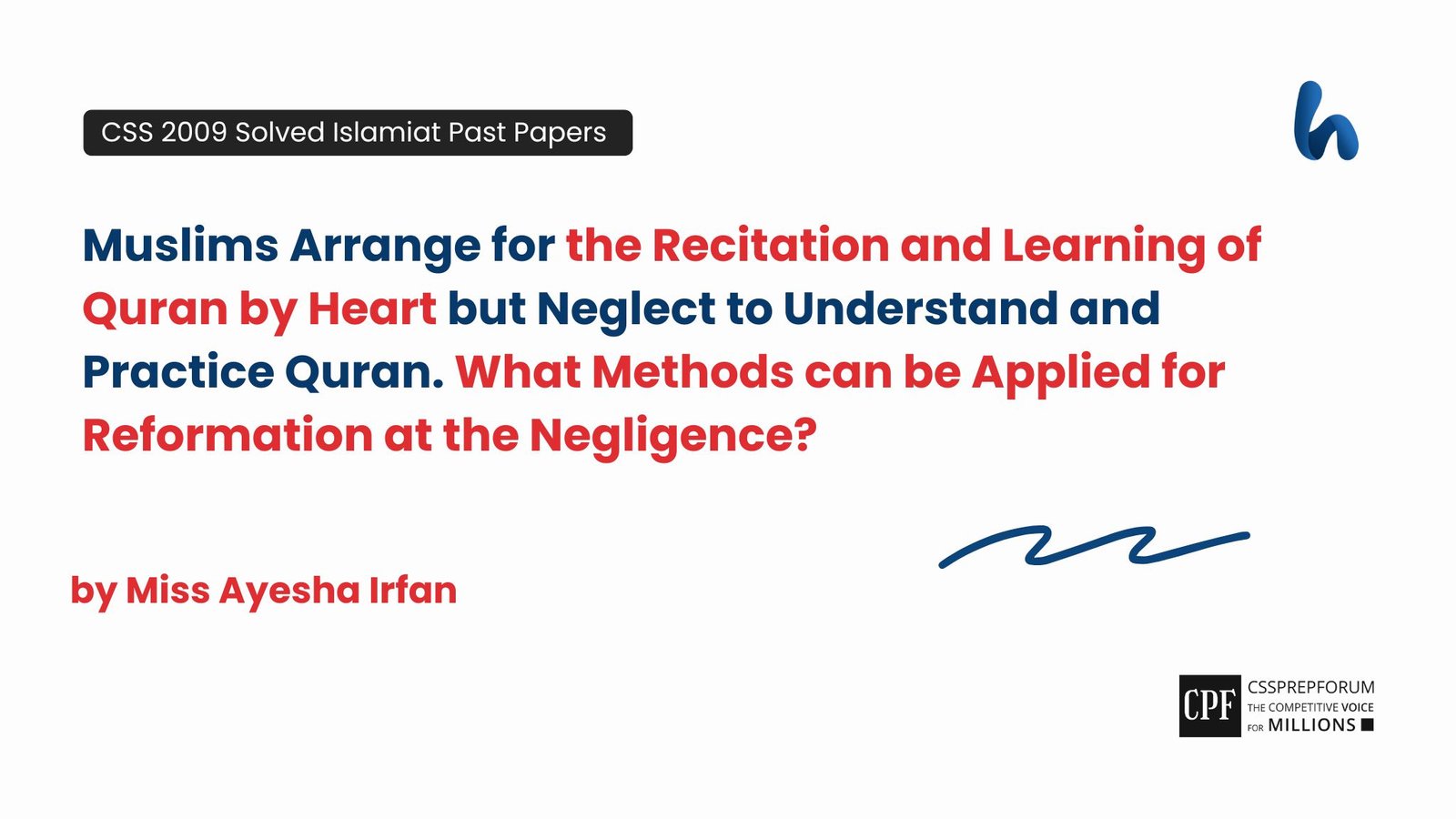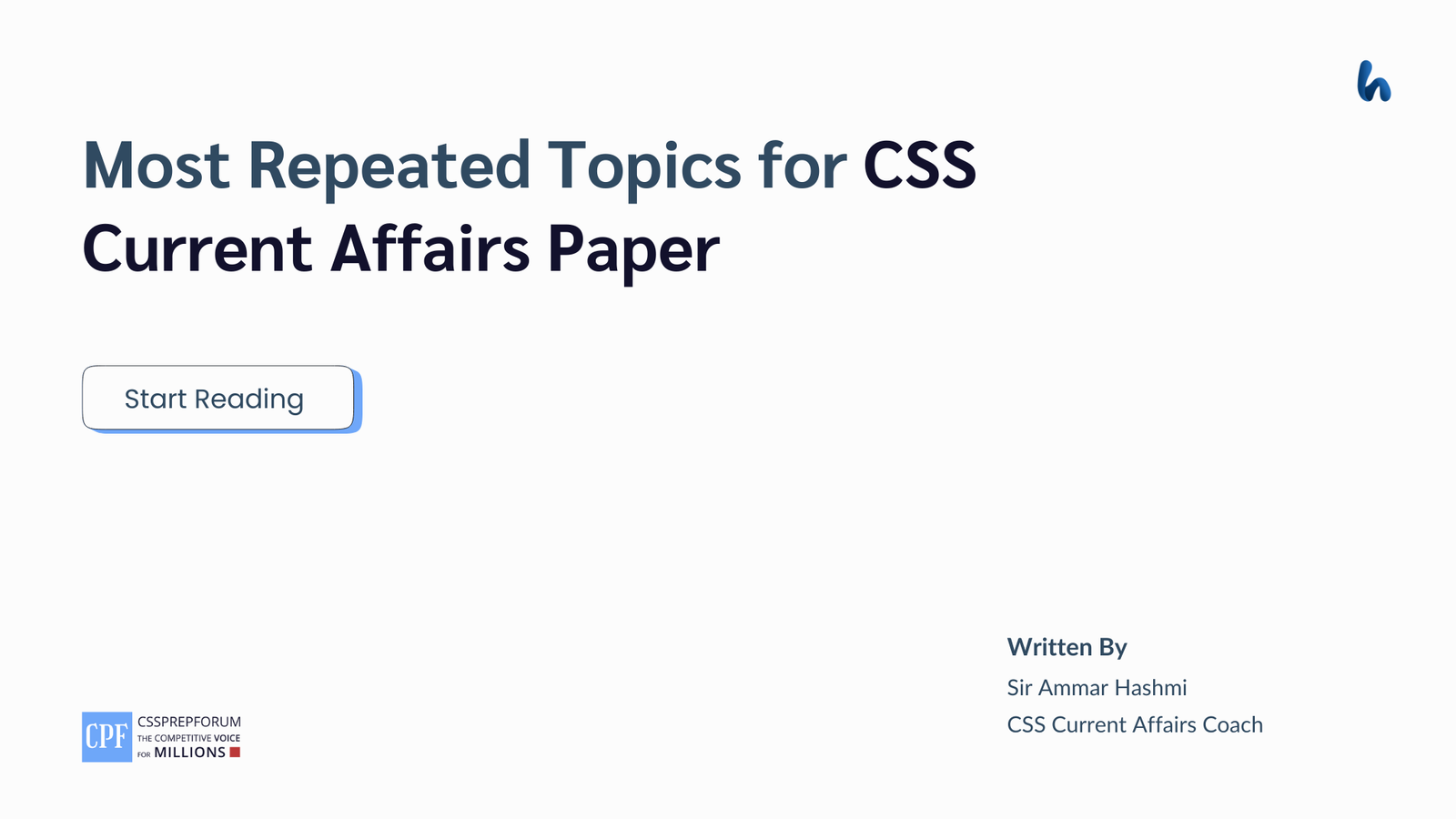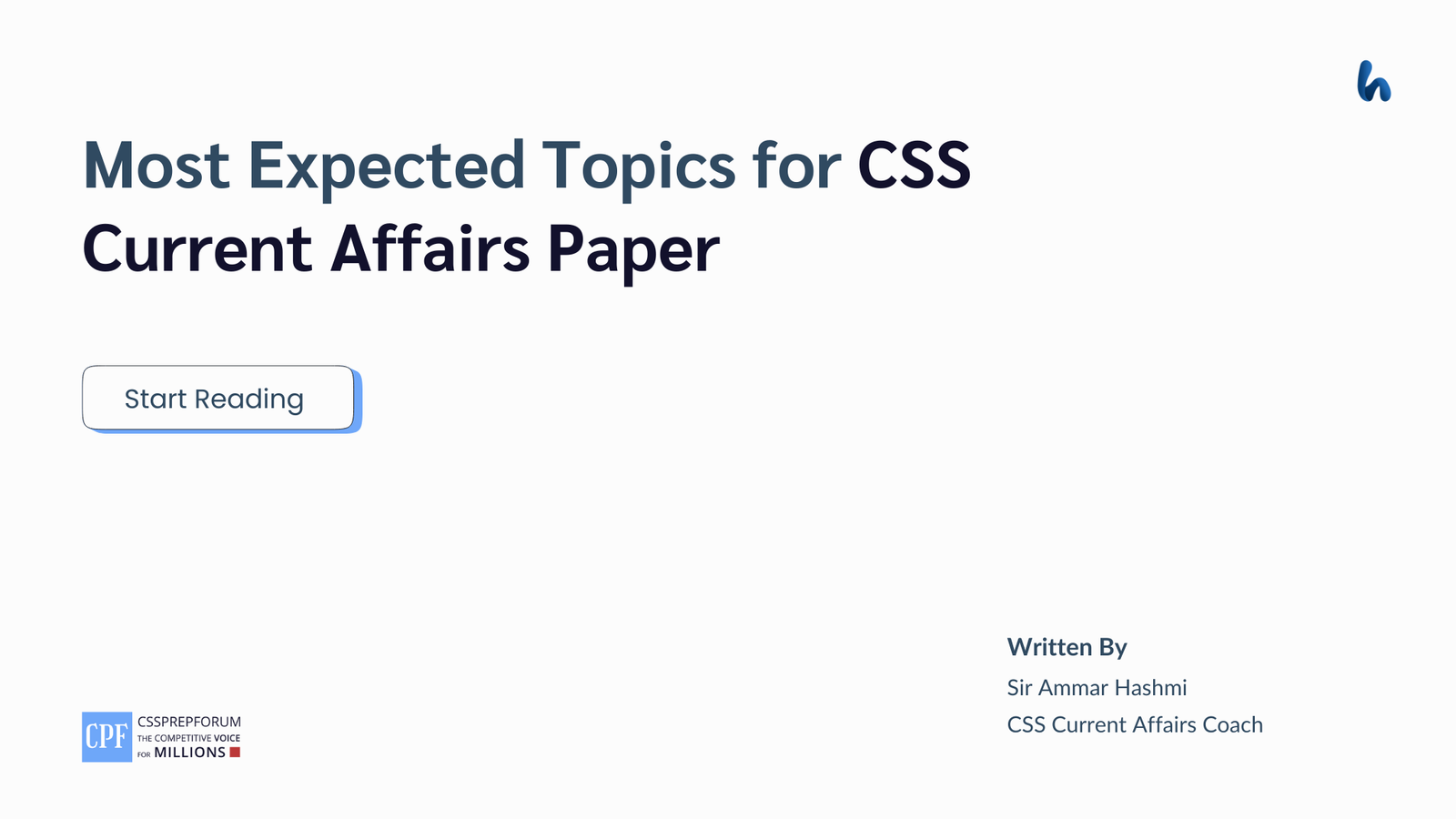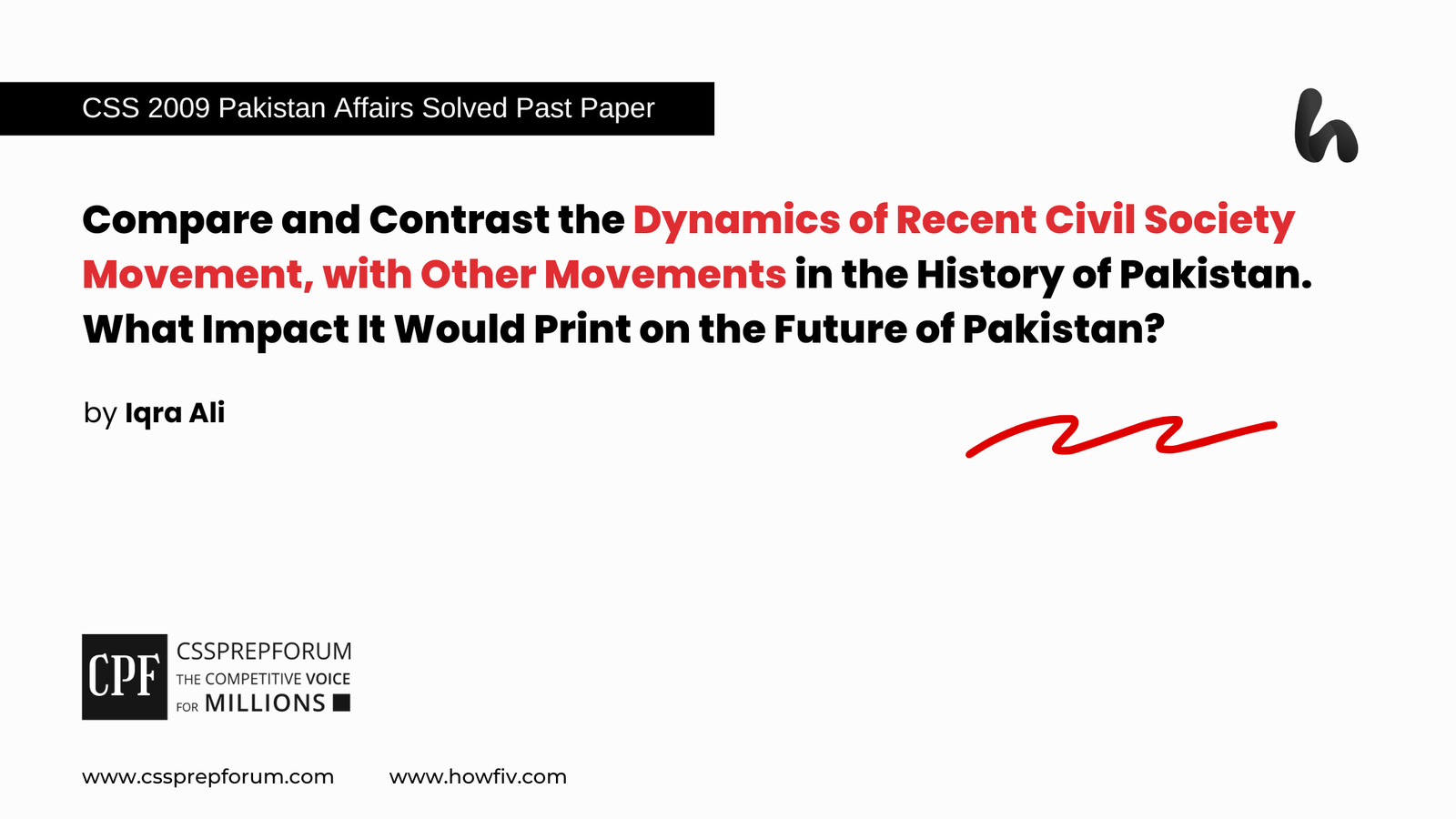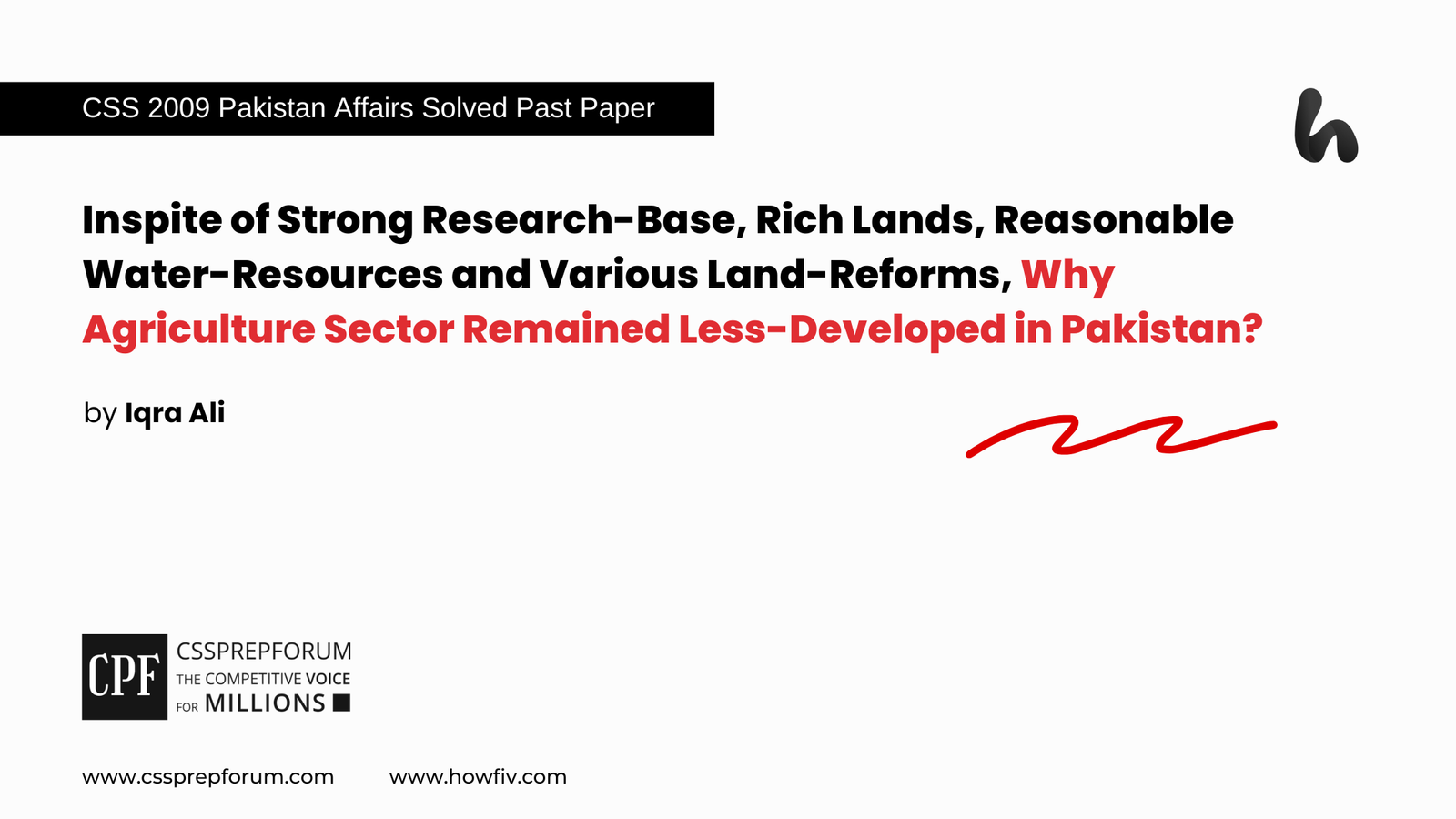PMS 2022 Solved Islamiat Past Papers | Itijhad‘s Significance in Today’s Globalized Environment
The following question of PMS Islamiat 2022 is solved by Miss Ayesha Irfan, the highest scorer in CSS Islamiat. Moreover, the question is attempted using the same pattern taught by Sir Syed Kazim Ali to his students, who have scored the highest marks in compulsory subjects for years. This solved past paper question is uploaded to help aspirants understand how to crack a topic or question, write relevantly, what coherence is, and how to include and connect ideas, opinions, and suggestions to score the maximum.

Question Breakdown
For this specific question, the examiner asked about the Concept of Itijhad, its types and importance, and its importance in today’s globalized environment. The first step in writing your response is to provide a concise synopsis of its key points. Next, write your answers by spitting them out in chunks according to the question. Provide a conclusion and critical analysis to wrap up your answer.
Outline
1-Introduction
2- Types of Ijtihad
- ✓ Ijtihad Intiqali
- ✓ Ijtihad Inshai
- ✓ Ijtihad by Derivation (Ijtihad al-Istimbat) and Consensus (Ijtihad al-Ijma)
- ✓Public Interest Ijtihad (Maslaha)
- ✓Custom-Based Ijtihad (Urf)
- ✓Ijtihad of Necessity (Darura)
3–Importance of Ijtehad according to the Quran and Sunnah
4-Relevance of Ijtihad in the modern era
- ✓ The solution to political and economic challenges
- ✓ The solution to evolving social issues, explicitly empowering women
- ✓ Combating humanitarian issues, warfare, and Fostering Globalization
5- Critical analysis
6- Conclusion

Answer to the Question
Introduction
Ijtihad is arriving at a verdict in Islamic law by independently interpreting the legal sources: the Qur’an and the Sunnah. Traditionally, a person who used Ijtihad must be an alim or Islamic law scholar, known as a mujtahid. However, this word and jihad come from the Arabic root juhd. “Ijtihad” describes the effort or striving required for any undertaking that entails a certain amount of suffering. Juhd denotes carrying a hefty load, while Ijtihad denotes intellectual labour. Nonetheless, Islamic fiqh, Ijtihad, and Shura emphasize judgment, and the Quran exhorts Muslims to uphold justice. In today’s globalized world, air to trees is just as vital for society. Therefore, when there is silence regarding the topics covered by the revealed sources of law, the rule of interpretation is essential. Because of this, Ijtihad is recognized as a source of Islamic law, although it is not considered the same as the Quran and Sunnah.
Types of Ijtihad
- Ijtihad Intiqali
The Islamic legal term “Ijtihad Intiqali” describes a form of Ijtihad (independent reasoning) in which a jurist applies the ideas of a different school of Islamic jurisprudence (madhhab) to interpret a legal issue, effectively “transferring” their reasoning to the framework of another school while still upholding the fundamentals of Islamic law. This type of Ijtihad involves taking ideas from another legal school to solve a current issue that may not be addressed explicitly in the established interpretations of their school. For example, the ideas derived from past scholars’ decisions on debt and contracts can be used to settle contemporary financial conflicts.
- Ijtihad Inshai
To solve a current issue that the Quran or Hadith does not explicitly address, “Ijtihad Inshai” refers to the process of applying the Islamic legal principle of “Ijtihad” (independent reasoning) to a novel or unresolved issue. This effectively results in a new legal interpretation founded on the accepted principles of Islamic jurisprudence. For example, even though there isn’t a specific Hadith or verse in the Quran that addresses explicitly this contemporary situation, a Muslim scholar may use “Ijtihad Inshai” to analyze the principles of Riba (an interest that is prohibited in Islam) in the context of digital banking and render a decision based on their interpretation of the fundamental principles. A scholar must thoroughly comprehend the Quran and Hadith and established principles of Islamic jurisprudence to execute Ijtihad Inshai, which guarantees that their interpretation is in accordance with the spirit of Islamic law.
- Ijtihad by Derivation (Ijtihad al-Istimbat) and Consensus (Ijtihad al-Ijma)
Islamic jurists use Ijtihad by derivation to draw new conclusions from the Quran and the Sunnah. Scholars must critically examine textual evidence to understand the meaning and ramifications of Islamic teachings in light of new developments. Further understanding of extracting values and meaning from original materials is also necessary. Making decisions on matters with little direct direction from the Quran and Sunnah also requires a group of disqualified Islamic experts. To maintain credibility and acceptance within the Muslim community, this approach is constructive when tackling novel socioeconomic, technological, or ethical issues that call for widespread agreement. Because it represents the collective knowledge of experienced experts, it strengthens Islamic law’s communal and unified character. For example, determining whether online transactions are lawful by considering the tenets of Islamic business developed by consensus on customary activities such as marketplace trade.
- Public Interest Ijtihad (Maslaha)
It is an approach to Islamic jurisprudence that aids in emphasizing society’s welfare and general well-being when decisions are being made. If primary sources are scarce, scholars can use Maslaha to generate rulings that protect society and avoid harm, as long as it does not go against fundamental Islamic values. In addition to maintaining justice, this can guarantee that Islamic rules remain universal and flexible enough to meet societal demands. A notable example is the case of Umar ibn al-Khattab, who raised the penalty for alcohol consumption to discourage people from doing so because he thought a more severe punishment would benefit the public. Other examples might include modifying Islamic laws governing business dealings to reflect contemporary economic realities to advance social welfare or permitting exceptions to fasting regulations in dire situations to safeguard public health.
- Custom-Based Ijtihad (Urf)
It is characterized as jurisprudence, where the rulings are consistent with Islamic teachings. Scholars frequently draw conclusions based on established social conventions when Islamic sources are silent. It emphasizes how Islamic law is flexible enough to include constructive cultural values and continues to apply in various countries. Urf encourages a more inclusive and contextually aware application of Islamic principles by recognizing regional customs. Examples of this could be using the length of a typical workday in a particular area to establish when an employee is entitled to overtime compensation, taking into account the local custom of celebrating Eid holidays to develop the precise dates or modifying the terms of a marriage contract based on accepted Islamic standards while making sure the customs adhere to the fundamentals of Sharia law.
- Ijtihad of Necessity (Darura)
Standard procedures are momentarily modified during severe emergencies to avoid injury or hardship in Ijtihad if needed. In situations of actual necessity, rigorous adherence to specific laws may not be possible or may even cause undue pain, as this principle acknowledges. This kind of Ijtihad also preserves the harmony between the practical world and moral principles, highlighting how Islamic laws benefit humanity under trying circumstances. Organ donation is a well-known example; understanding the vital necessity to save lives, scholars have conducted Ijtihad to examine whether organ transplants are acceptable in modern settings.
The importance of Ijtihad according to the Quran and Sunnah
The primary source of Islamic law, aside from the Quran and the Sunnah, is Ijtihad. One particular passage in Surah An-Nisa’ 83 encourages gathering information to make decisions: And if any tidings, whether of safety or fear, come unto them, they noise it abroad, whereas if they had referred it to the messenger and to such of them as are in authority, those among them who can think out the matter would have known it. If it had not been for the grace of Allah upon you and His mercy, ye would have followed Satan, save a few (of you). Above all, the Prophet Muhammad stressed the importance of ijtihad. The famous and well-known hadith about Yemen’s governor, Muaz bin Jabal, is a prominent example. The Prophet asked him: “0 Muaz, by what rule would you be guided?”. He responded with “By the Law of the Quran”. “But if you find no direction therein?” the Prophet inquired. “Then I will act according to the Sunnah of the Prophet,” Muaz responded.
“What if that doesn’t help?” he was asked again. “I will act based on my judgment,” he replied. The Prophet expressed satisfaction and gratitude to God, saying, “Praise be to Allah, who guides the Messenger of His Apostle as He pleases.” This hadith shows that the Prophet supported the idea of Ijtihad.
Relevance of Ijtihad in the modern era
- The solution to political and economic challenges
One of the main problems facing many Muslim nations today is political and economic hardship, and Ijtihad can be crucial in resolving these problems. When it comes to government, the Quran highlights the importance of fairness and Shura (consultation): “Indeed, Allah commands you to render trusts to whom they are due and when you judge between people to judge with justice…” (4:58). A fair economic system is described in the Quran as follows: “…so that it will not be a perpetual distribution among the rich from among you.” (Quran 59:7). Furthermore, public gatherings and other forms of public participation were an essential part of political decision-making throughout Umar ibn al-Khattab’s Caliphate. Ijtihad can now be used to address current political and economic issues. Therefore, Ijtihad remains crucial in tackling unemployment, wealth inequality, and poverty by modifying ancient ideas to answer contemporary global economic and political issues.
- Solution to evolving social issues, explicitly Empowering women
Furthermore, Islam has historically granted women greater authority through education, property rights, and social contact. Men and women have equal spiritual standing, according to the Quran. Therefore, by reinterpreting some areas of Islamic law through applying Ijtihad, contemporary scholars can guarantee women’s full empowerment by Islamic principles while adjusting to the current situation. Thus, the Muslim Ummah can address changing social challenges, particularly women’s empowerment, through Ijtihad.
- Combating humanitarian issues, warfare, and Fostering Globalization
The Quran and Sunnah highly value justice, peace, and altruism. Islam calls for reducing injury, protecting civilians, and treating prisoners fairly even during times of conflict.” And if they incline to peace, then incline to it [also] and rely upon Allah…” (Quran 8:61). The ethical behaviour in combat was highlighted in Abu Bakr al-Siddiq’s principles of warfare. The Muslim reaction to contemporary conflict, terrorism, and humanitarian emergencies can be reframed through Ijtihad. With an emphasis on diplomacy, humanitarian assistance, and peacebuilding grounded on Islamic values, scholars today can offer guidance on moral responses to occupation and war. Due to globalization, a wide variety of cultural, political, and economic elements now significantly influence the Muslim world. Ijtihad, on the other hand, allows Muslims to participate in globalization while upholding Islamic values.
Critical analysis
Ijtihad is undoubtedly still relevant in the modern world. It is still very appropriate in the contemporary world since it addresses new issues and promotes vibrant Islamic thought. Because of its flexibility, Islamic research can keep up with current events, guaranteeing that Islamic values will always be relevant.
Conclusion
In a nutshell, Ijtihad is the primary source of Islamic law, second only to the Quran and Sunnah. Ali persisted in using Ijtihad during the Caliphate era, despite the Quran’s and the Sunnah’s unequivocal prohibitions. Ijtihad is, therefore, only employed in a peripheral way in the present day unless the legal system is entirely overhauled. There is no other way to use it. Thus, Ijtihad must be modified to properly repurpose it within a new Islamic framework and bring about modern legal reform.

CSS Solved Past Papers’ Essays
Looking for the last ten years of CSS and PMS Solved Essays and want to know how Sir Kazim’s students write and score the highest marks in the essays’ papers? Then, click on the CSS Solved Essays to start reading them.
CSS Solved Essays
CSS Solved General Science & Ability Past Papers
Want to read the last ten years’ General Science & Ability Solved Past Papers to learn how to attempt them and to score high? Let’s click on the link below to read them all freely. All past papers have been solved by Pakistan’s top CSS GSA coach having the highest score of their students.
General Science & Ability Solved Past Papers


